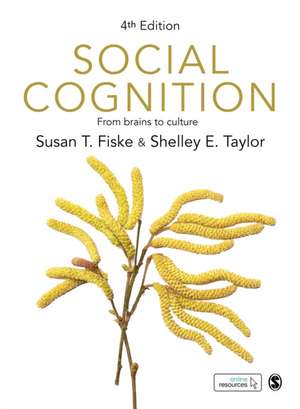Social Cognition: From brains to culture
Autor Susan T. Fiske, Shelley E. Tayloren Limba Engleză Paperback – 23 noi 2020
This book will help you understand how these shortcuts work, why they exist, and how they are changing.
There are examples in each chapter which
* Show applications in the real world to help with your understanding
* Highlight significant pieces of research to help you demonstrate knowledge of a wide range of sources
* Explain researching in social cognition to improve your skills and give ideas for your own research.
Check out the accompanying online resources for more.
Preț: 464.22 lei
Nou
88.83€ • 92.99$ • 73.50£
Carte disponibilă
Livrare economică 17-31 martie
Livrare express 28 februarie-06 martie pentru 76.28 lei
Specificații
ISBN-10: 1529702089
Pagini: 672
Dimensiuni: 195 x 265 x 41 mm
Greutate: 1.39 kg
Ediția:Fourth Edition
Editura: SAGE Publications
Colecția Sage Publications Ltd
Locul publicării:London, United Kingdom
Cuprins
Chapter 1: Introduction
Part 1: Basic Concepts in Social Cognition
Chapter 2: Dual Modes in Social Cognition
Chapter 3: Attention and Encoding
Chapter 4: Representation in Memory
Part 2: Understanding Individual Selves and Others
Chapter 5: Self in Social Cognition
Chapter 6: Attribution Processes
Chapter 7: Heuristics and Shortcuts: Efficiency in Inference and Decision Making
Chapter 8: Accuracy and Efficiency in Social Inference
Part 3: Making Sense of Society
Chapter 9: Cognitive Structures of Attitudes
Chapter 10: Cognitive Processing of Attitudes
Chapter 11: Stereotyping: Cognition and Bias
Chapter 12: Prejudice: Interplay of Cognitive and Affective Biases
Part 4: Beyond Cognition: Affect and Behavior
Chapter 13: From Social Cognition to Affect
Chapter 14: From Affect to Social Cognition
Chapter 15: Behavior and Cognition
Descriere
The social world is complicated and our minds are limited, so we take shortcuts. You have to make quick decisions – this person is dangerous, this one is not. The shortcuts we take mostly work well enough, because, after all, we survive. But some are deeply unjust, including racial or social class categories or other unfair stereotypes.
This book will help you understand how these shortcuts work, why they exist, and how they are changing.
There are examples in each chapter which
* Show applications in the real world to help with your understanding
* Highlight significant pieces of research to help you demonstrate knowledge of a wide range of sources
* Explain researching in social cognition to improve your skills and give ideas for your own research.
Check out the accompanying online resources for more.



